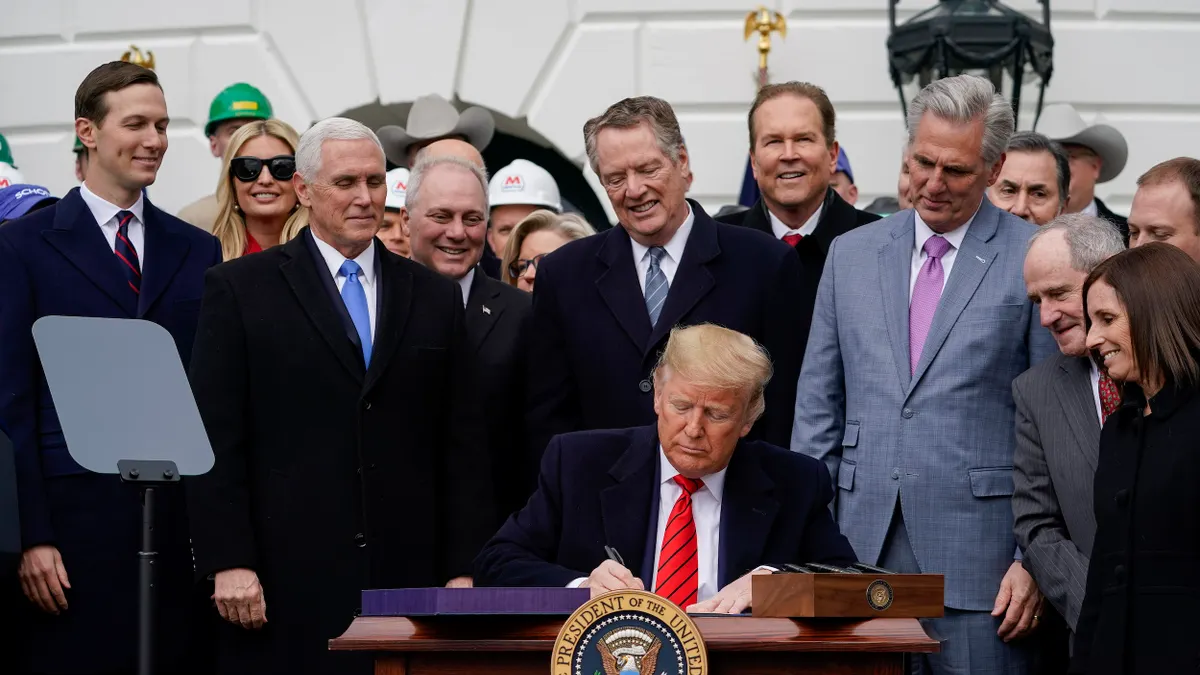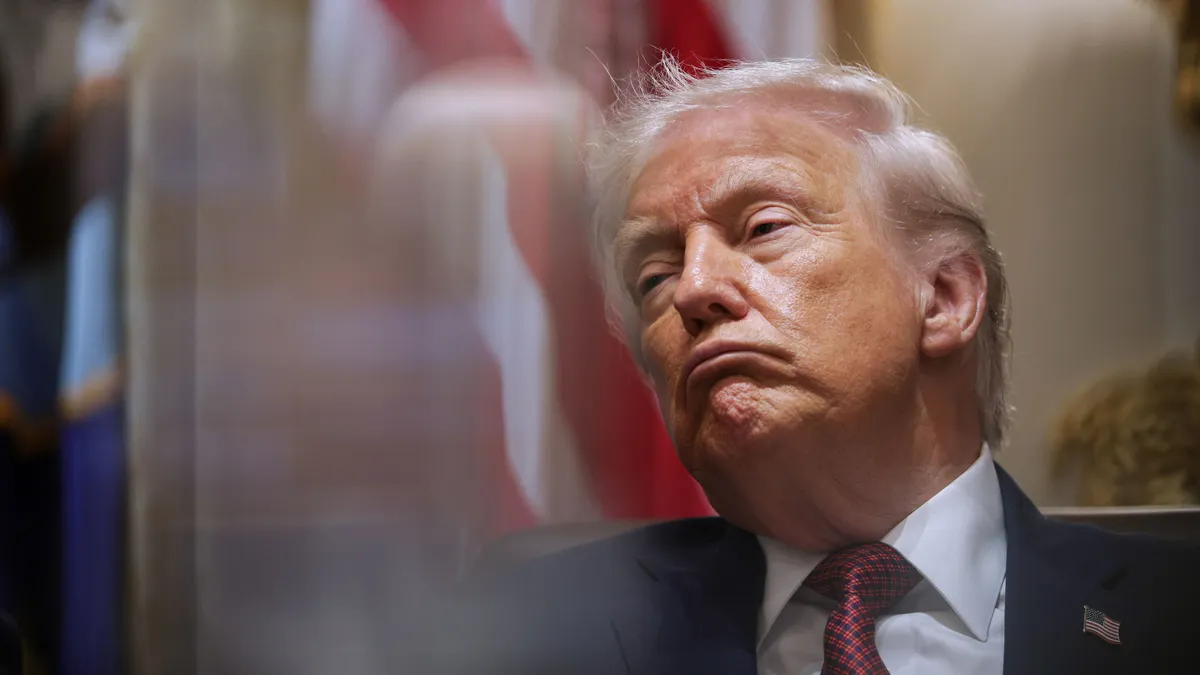The United States, Mexico and Canada Agreement’s (USMCA) biggest draw for proponents of its predecessor NAFTA — and the biggest disappointment for those opposed — is the similarity between the two.
After the three countries' leaders agreed to a final version of the USMCA in October, the task of ratification fell to the legislatures of the three nations and ironically, the possible penalties for not ratifying the deal are starting to appear more drastic than the differences between NAFTA one and NAFTA two.
Last month, the International Monetary Fund (IMF) released an analysis of the economic impact of the USMCA showing stasis for Mexico and Canada and a slight economic loss for the U.S. The most substantial drops predicted in exports were apparel and textiles, and motor vehicles and parts. Essentially, a trade deal that should not have ruffled many feathers, by virtue of being quite similar to the deal it is replacing, has ended up ruffling plenty.
President Donald Trump has threatened many times to accelerate the U.S. withdrawal from NAFTA in order to encourage lawmakers on all fronts to ratify its replacement. Some recent legal thinking holds that he may not have the power to do so without Congress, but if he does pull the U.S. out of NAFTA before ratifying the USMCA, the U.S. trading relationship with its neighbors will revert back to pre-1994 status.
Getting the deal through the House will require 30 Democrats to vote in favor of ratification and since the most substantial stakeholder qualms come from key constituencies, reaching a majority seems no more likely than it did in October.
The list of parties making statements against or putting conditions on their support for the USMCA has grown in the past six months. And new complications surrounding U.S.-Mexico trade caused by the current slowdown on the border are further muddying the waters.
Both Mexico and Canada have stated multiple times that they do not wish to reopen negotiations. But some U.S. legislators are calling for just that. Here are the issues and parties holding up what President Trump has called his number one priority for 2019.
Organized labor objections put Democrats in a holding pattern
The AFL-CIO, and subsequently, Democrats in Congress, have had major qualms with the USMCA since it was first announced. (The labor organization was also a vociferous critic of the original NAFTA deal.)
Regarding what AFL-CIO President Richard Trumka called “the new NAFTA,” the labor leader wrote in an op-ed for The Hill that though the deal contains, “some improvements on labor protections, foreign investment, and American content standards,” it falls short on details regarding Mexican labor laws. Trumka and other labor representatives argue low wages and poor working conditions in Mexico keep U.S. wages from rising and make U.S. manufacturing less competitive. Higher wages and better conditions in Mexico would relieve “some of the downward pressure on American wages,” Trumka wrote.
This deal is incomplete. A vote would be premature. To move forward with the ‘New #NAFTA’ in its current form would be a colossal waste of an important opportunity. However, there’s still time to fix this deal.
— Richard Trumka (@RichardTrumka) April 1, 2019
Speaker of the House Nancy Pelosi has said she won’t call a vote to ratify the deal until Mexico changes its labor laws. Pelosi also mentioned to Politico that some language in the deal needs to change to ensure proper enforcement, though she did not describe this element as a deal breaker. Stronger collective bargaining rights for Mexican workers, that require full union membership votes could enable the changes Trumka and others have called for.
Friday, the Mexican majority party in its lower house added language to a labor bill that would reportedly meet the U.S. demands. AFL-CIO Trade Policy Specialist Celeste Drake told Politico the draft bill “is an improvement and meets a key criteria of ensuring workers can vote on their collective bargaining agreements.” Pelosi has since said that should the Mexican bill pass, she will need to ensure proper enforcement to consider this a resolution of the issue.
Trump himself contradicts the deal with tariff threats
The USMCA requires that cars contain 75% content from the three nations in the deal — up from NAFTA's 62.5%— which could cause some automakers to undergo pricey supply chain transitions. But on the whole, the industry has supported the deal. Ford, for example, put out a statement almost immediately in support of ratification.
The Trump administration’s view is that these provisions will encourage further development of the U.S. auto sector — White House adviser Larry Kudlow put the value at $80 billion and 70,000 to 80,000 jobs.
Border security "is more important to me than the USMCA.”

Donald Trump
President of the United States
It would seem counterintuitive for President Trump to make moves that could undermine his own multilateral trade deal, but last week, that’s exactly what began to take shape. Trump said to reporters Friday that border security "is more important to me than the USMCA.” He threatened the U.S. would be "forced to Tariff at 25% all cars made in Mexico and shipped over the Border to us." The tariffs, he added, will supersede the USMCA.
The Washington Post pointed out that the USMCA is designed so that Trump cannot inflict ad hoc tariffs on Mexican auto parts, but when a reporter pointed this out to Trump he reportedly said, “We haven’t finished our agreement yet.”
Though Mexico isn’t taking the threatened auto tariffs seriously, according to Politico, statements that suggest the President may overrule the deal at will are adding animus and uncertainty to an already fraught ratification process.
Canadian Steel tariffs could hinder ratification from north of the border
Existing tariffs on Canadian steel present a particularly pressing threat to the deal because of election timing for both neighbors. Canada’s foreign minister, Chrystia Freeland, said last week that tariffs on Canadian steel are a sticking point and the country won’t ratify the deal until they are dropped.
Canadian elections are in October 2019 and the Parliament adjourns in June. Sen. Chuck Grassley (R-Iowa) has expressed the need to ratify before that time or at least before the U.S. general elections in 2020. This is unlikely to happen without removing the tariffs. Pelosi has not expressed a specific timeline that she sees as realistic but has indicated that ratification should not be rushed and will "take some time."
The same IMF paper that showed a slight economic loss for the U.S. also showed that trading volume among the three nations would stay roughly the same. Removing U.S. tariffs on imported aluminum and steel, and thus ending the retaliatory tariffs that resulted, would increase trade volume five-times more than what is expected under the USMCA.
There are plenty of other contentious issues throughout the deal that could make ratification difficult if unhappy constituencies can wield enough power.
House Democrats are reportedly dissatisfied with intellectual property provisions in the deal they say would preserve high pharmaceutical drug prices.
Cattle ranchers are also unhappy since the deal, in their view, maintains the parts of NAFTA that gave them no protection from cheaper imported beef and cattle.
The list grows as the potential timeline for ratification stretches into the future.
Another report assessing the impact of the USMCA on the American economy is expected in the next few days — this time from the U.S. International Trade Commission.






















